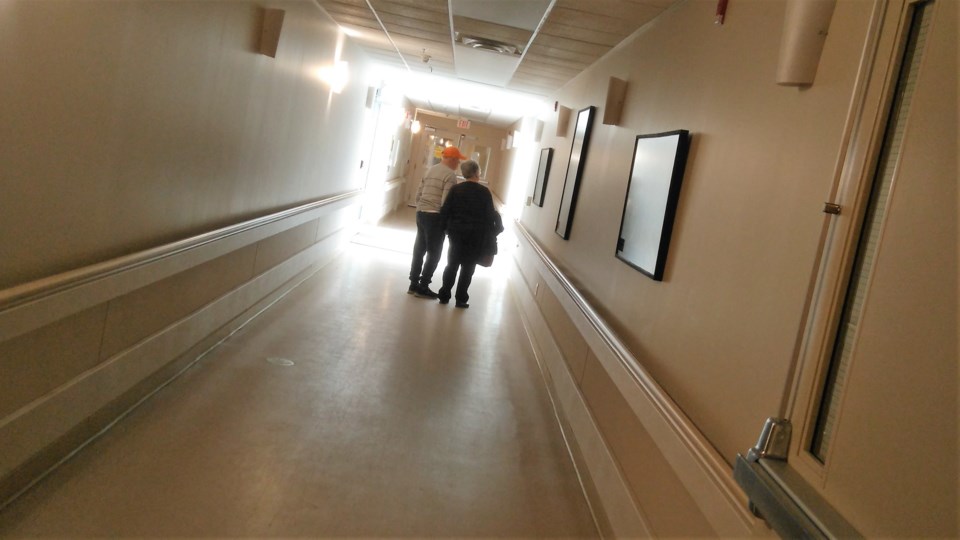Several items on the North Bay council agenda Tuesday are related to a massive demographic surge of elderly on the way, with two motions likely to create political sparks.
First up is the Near North Palliative Care Network providing a clarion call to prepare for a tsunami of terminal Baby Boomers needing assistance in their last months and weeks of life.
The NNPCN’s Scott Gardiner will be presenting very stark projections for the exponential growth of those 85 years old and older. Beginning in 2026, it is projected that one million Ontario residents to be in that cohort with a shade more than a third of them requiring palliative support. And the number grows by at least 250,000 every five years until it peaks at 4.5 million in 2046. That means almost 1.6 million residents in the province will be in need of palliative care by then – despite Ontario only having 4,000 such beds in all the hospitals plus an estimated 500 hospice beds.
The report highlights how much more it costs to provide such care in hospitals, long-term care facilities and hospices, compared to palliative networks providing the support in the client’s home or apartment.
I’ll wait for the presentation to better understand what is involved in the dramatic differences but even the least expensive options are considerable. See the report HERE.
That topic sets the tone for two issues that deal with some of the political and administrative hurdles North Bay is facing.
Coun. Tanya Vrebosch is introducing two motions relevant to Cassellholme (East Nipissing District Home for the Aged) and Castle Arms, the co-located active senior living apartments, both seconded by Coun. Mac Bain.
The first one seeks council to direct the interim chief administrative officer to report on the last council’s effort to take over Cassellholme as a city owned home, rather than one with eight other municipalities involved. This issue came out of the conflict that arose during the financing logjam for the long-term care home’s restoration and expansion project. Few of the other municipalities want to be involved anymore. And the city, which pays the lion’s share of member contributions toward operating and capital costs, can’t use the asset to offset its financial investment unless they run solely under the municipal umbrella.
In December 2021, council directed staff to engage a consultant to undertake a comprehensive review of the steps needed to make the transition. Vrebosch, who was on the Cassellholme Board of Management until resigning in protest, wants a report on the progress of the third-party review by March 28.
It’s a sticky wicket for those who fear city councillors in the future might restrict property tax investment in the home during tight times. As a separate entity with its own board and power to levy, some argue that the fiduciary duty of directors is better focussed solely on the best interest of Cassellholme.
The second motion is more complicated and possibly contentious, with Vrebosch asking council to direct the interim CEO to “retain appropriate advisors with legal and financial expertise to review” the whys and wherefores of the recent change to the Castle Arms board.
Up until the fall of 2021, the Cassellholme and Castle Arms boards were identical, but it was changed, the chief administrative officer said at the time, to reflect the provincial directive to not have the same people on separate boards.
The change, though, raised eyebrows because it appeared to take control of the $25-million asset outside municipal governance at a time the city was looking at taking it over.
Of course, there’s more to it than that and the conflict at council will include those who remained on the Cassellholme board – councillors Mark King and Chris Mayne, who was the chairman, and newly elected Coun. Jamie Lowery, the CAO of Cassellholme at the time and now executive director of Castle Arms.
It was one of the many topics raised during the municipal election campaign during my interviews with Lowery, Mayne and Dave Mendicino (who was on the Cassellholme board starting in late fall 2021, but not re-elected to city council).
I’m still a bit confused as to who is running what and why, so it might be interesting to see if council will end up split on the subject Tuesday evening and going forward.
Both notions require consultation and that’s always a cost consideration, yet there may be more money and liabilities at stake down the road.
I’ve cued the interviews to the part where the three council candidates talked about the issues so interested readers can get a refresher about the issue before Tuesday’s meeting.
The bottom line is that the city and province have a few kinks to work out when it comes to long-term care responsibilities with an unimaginable wave of elderly who will need palliative care as well.
And there’s no time to waste. My recommendation is for everyone to just stop getting old, society isn’t ready.
Dave Dale is a veteran journalist and columnist who has covered the North Bay area for more than 30 years. Reader responses meant as Letters to the Editor can be sent to [email protected]. Contact the writer directly, email: [email protected] or check out his website www.smalltowntimes.ca



